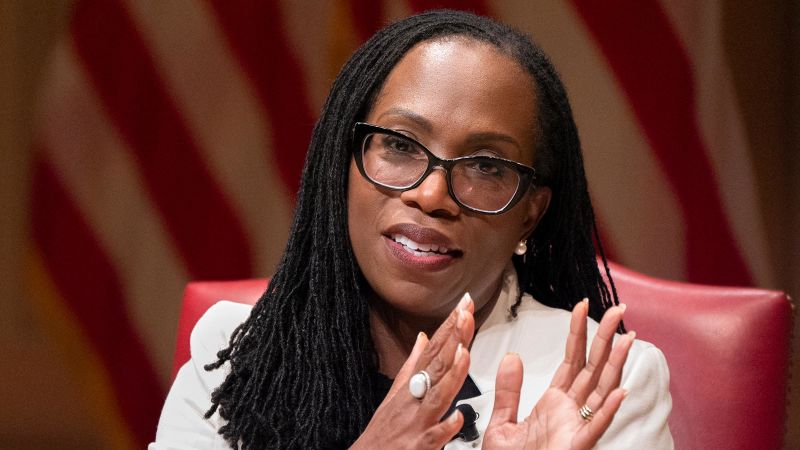CNN
—
Justice Ketanji Brown Jackson, the Supreme Court’s most junior member and a member of its liberal wing, told an audience in Indianapolis on Thursday that she was concerned about the state of American democracy.
After speaking about the book she published last year, Jackson was asked during a “lightning round” of questioning what keeps her up at night.
“I would say the state of our democracy,” Jackson said in response. “I am really very interested in getting people to focus and to invest and to pay attention to what is happening in our country and in our government.”
Jackson did not say what, specifically, concerned her about the state of democracy, though she has recently written a series of scathing dissents critical of both President Donald Trump’s administration and the Supreme Court’s review of cases involving its policies.
“For some reason, this court sees fit to step in now and release the president’s wrecking ball at the outset of this litigation,” Jackson wrote in a dissent this week in a decision allowing the White House to move forward with plans to dramatically reduce the size of the federal government. “In my view, this decision is not only truly unfortunate but also hubristic and senseless.”
Jackson did not mention Trump by name during her remarks at the Indianapolis Bar Association. She weighed in on the administration’s criticism of the judiciary earlier this year as well during an event in Puerto Rico in which she also did not mention Trump specifically.
“The attacks are not random. They seem designed to intimidate those of us who serve in this critical capacity,” Jackson told a judges’ conference in May, according to Politico. “The threats and harassment are attacks on our democracy, on our system of government. And they ultimately risk undermining our Constitution and the rule of law.”
In recent weeks, Jackson has emerged as a forceful dissenter in several high-profile cases involving Trump.
She wrote a scorching dissent in the court’s blockbuster decision last month that curbed the power of lower courts to issue temporary orders blocking the president’s policy. The case dealt with Trump’s effort to end birthright citizenship through an executive order.
“Perhaps the degradation of our rule-of-law regime would happen anyway,” Jackson wrote in dissent. “But this court’s complicity in the creation of a culture of disdain for lower courts, their rulings, and the law (as they interpret it) will surely hasten the downfall of our governing institutions, enabling our collective demise.”
Jackson registered her dissent with “deep disillusionment.”
Earlier Thursday, a federal judge blocked Trump’s executive order seeking to end birthright citizenship again in a new, class-action lawsuit.
Justice Amy Coney Barrett, a conservative who wrote the majority opinion in the birthright case, used a considerable amount of that opinion to respond to Jackson, at one point describing her colleague’s reasoning as untethered “to any doctrine whatsoever.”
US District Judge Jane Magnus-Stinson, who moderated the event Thursday, asked Jackson – without citing any specific case – if she was ever bothered by a majority opinion’s response to a dissent.
“I have a very thick skin,” Jackson responded. “My parents gave to me a sense of my own ability to write and to speak out and to say what I have to say and to not be really offended by other people saying what they have to say. I actually don’t get my feelings hurt, what I do is I try to respond as effectively as I can in my writings.”
Jackson said that sometimes after a principle dissent is written, “I have a slightly different perspective or a different take on something,” and she will decide, “I need to write on this case.”

